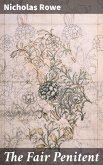In "The Squire," Arthur Wing Pinero masterfully interweaves themes of social class, morality, and personal ambition within the vibrant tapestry of Edwardian theater. This comedic play showcases Pinero's signature blend of wit and poignancy, deftly exploring the contrasts between societal expectations and individual desires. The plot centers around the titular Squire, a character embodying the complexities of the British gentry, as he grapples with deeper existential questions against the backdrop of an evolving society influenced by Victorian ideals. Pinero's sharp dialogue and keen observational humor reflect the literary shift towards character-driven narratives in the late 19th and early 20th centuries, offering both entertainment and a critical lens on contemporary issues of class and ethics. Arthur Wing Pinero, a prominent playwright of the era, was himself intertwined with the changing dynamics of British society. He began his career in the theatrical world as an actor and soon transitioned to writing, where his acute awareness of social nuance and human emotion flourished. Pinero's oeuvre often tackled the intersection of respectability and desire, emblematic of his own experiences in an era of shifting moral landscapes, enriching the character-driven focus seen in "The Squire." For readers and theater enthusiasts, "The Squire" is a delightful exploration of the conflicts between personal ambitions and societal expectations, making it an essential addition to any literary collection. Pinero's work not only entertains but also prompts reflection on the human condition, evoking thoughtful discussions about the nature of success and fulfillment. This play is highly recommended for those interested in the evolution of modern drama and the intricate dynamics of class dynamics.
Dieser Download kann aus rechtlichen Gründen nur mit Rechnungsadresse in A, B, BG, CY, CZ, D, DK, EW, E, FIN, F, GR, H, IRL, I, LT, L, LR, M, NL, PL, P, R, S, SLO, SK ausgeliefert werden.









